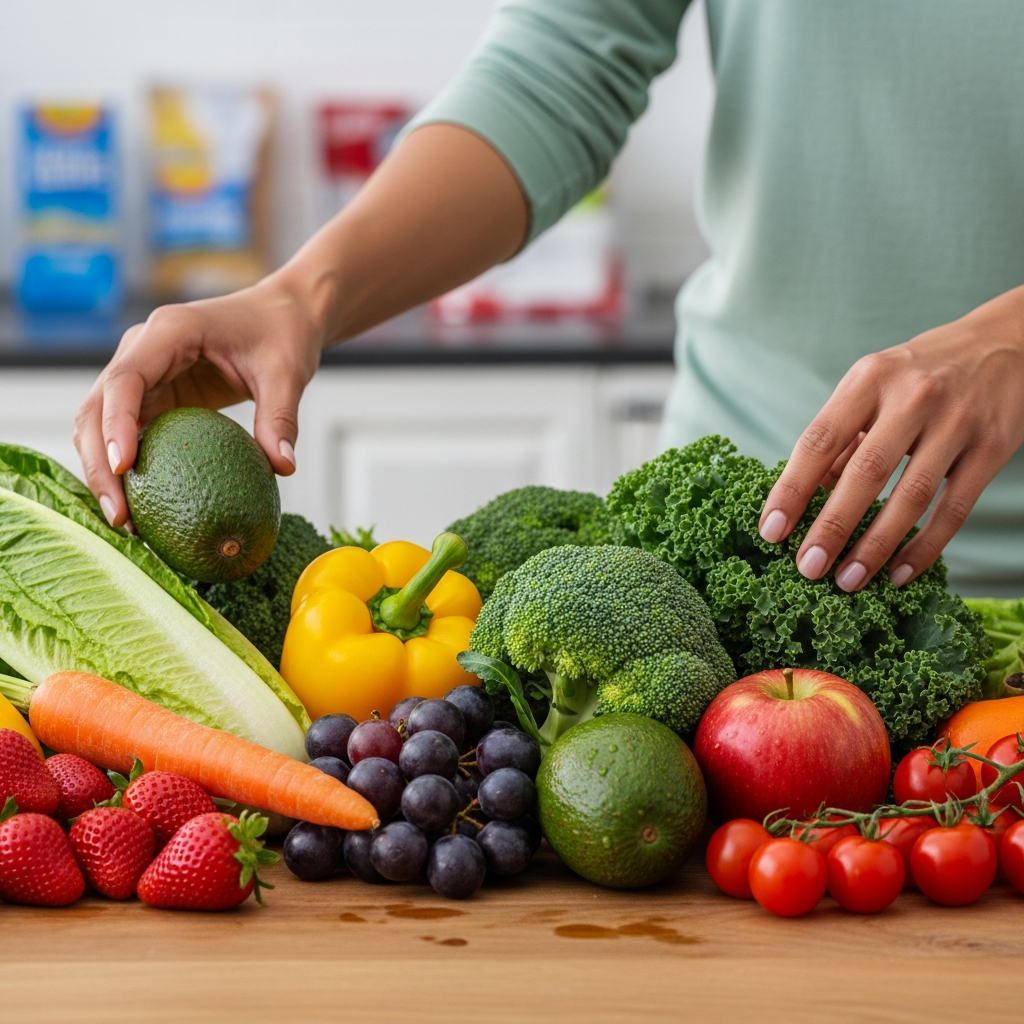Are you seeking to improve your diet and reduce your reliance on convenient, pre-packaged foods? Understanding the impact of ultra-processed foods (UPFs) on your health is the first crucial step. This comprehensive guide, informed by recent research and expert dietitian advice, offers practical strategies to gradually minimize UPFs and embrace a diet rich in whole, nourishing ingredients. Learn how making small, sustainable swaps can significantly boost your well-being and potentially reduce serious health risks.
Understanding Ultra-Processed Foods (UPFs): What Are They?
In today’s fast-paced world, distinguishing between genuinely healthy options and cleverly marketed products can be challenging. Ultra-processed foods (UPFs) are a category that often blurs this line. Dietitian Rosie Carr explains that UPFs are “commercially manufactured food products that have undergone multiple industrial processes and typically bear little resemblance to their original ingredients.” These items are designed for convenience, shelf stability, and maximal palatability.
UPFs are more than just sugar, oil, and refined carbohydrates. They frequently contain additives rarely found in a home kitchen. Think emulsifiers, stabilizers, artificial flavors, colors, and preservatives. These ingredients contribute to a highly engineered food product. Common examples you might encounter include fizzy drinks, pre-packaged cookies, ready meals, instant noodles, and many breakfast cereals.
A key characteristic of UPFs is their deliberate design to hit a “bliss point.” This is a scientific term for the ideal balance of salt, sugar, and fat. This precise combination makes these foods incredibly rewarding to our brains, often triggering powerful cravings and encouraging overconsumption.
The Hidden Risks of a UPF-Heavy Diet
While the convenience of UPFs is undeniable, a growing body of evidence highlights their potential health drawbacks. Beyond general nutritional concerns, recent research has unveiled more specific risks, particularly for women.
New Research Links UPFs to Bowel Cancer Risk in Women
A significant study, funded by Cancer Grand Challenges, has revealed a concerning link between high UPF consumption and an increased risk of specific growths that could precede bowel cancer in women. This research involved analyzing data from 29,105 women, with an average age of 45. Within this group, a notable 1,189 cases of early-onset adenomas were identified.
Adenomas are a type of polyp found in the bowel. According to Cancer Research UK, these polyps have the potential to develop into cancer over an extended period. The study’s findings indicated that women consuming the highest quantities of UPFs were 45% more likely to develop these early-onset adenomas. This was compared to women with the lowest intake.
It’s important to note the researchers’ caution: “causality cannot be determined” from these findings alone. However, the strong association warrants attention and further investigation. This builds upon existing concerns about UPFs contributing to weight gain, type 2 diabetes, heart disease, and poorer overall gut health due to their low fiber content and high levels of inflammatory ingredients.
A Dietitian’s Proven Strategy: Gradually Reducing UPFs
Faced with such insights, many people consider drastic dietary changes. However, dietitian Rosie Carr, from Second Nature, advocates for a more sustainable and realistic approach. Instead of attempting a complete overhaul or “going cold turkey” on all your favorite packaged foods, she recommends focusing on gradual, achievable adjustments.
Carr explains, “At Second Nature, we’ve found that people who focus on gradually including more whole foods rather than strictly avoiding UPFs tend to make more sustainable changes to their eating habits.” This positive framing encourages adding beneficial foods rather than feeling deprived. This strategy fosters long-term success and makes the journey towards healthier eating less daunting.
7 Actionable Steps to Transform Your Eating Habits
Ready to start your journey towards a diet with fewer UPFs? Here are seven practical and easy-to-implement steps recommended by dietitian Rosie Carr. These strategies are designed to help you make lasting changes without feeling overwhelmed.
1. Make Gradual, Sustainable Swaps
The most effective changes often start small. Begin by identifying your three most frequently consumed UPFs. Then, consciously seek out whole food alternatives to replace them. For instance, instead of reaching for a sugary breakfast cereal, opt for a bowl of plain porridge topped with fresh fruit. If crisps are your go-to snack, try a small handful of unsalted nuts or seeds. These consistent, minor adjustments accumulate significant benefits over time, making them far more sustainable than an abrupt diet overhaul.
2. Decode Ingredient Lists, Not Just Nutrition Panels
Many people focus solely on calorie counts or fat content on nutrition labels. However, Carr emphasizes that “The nutrition panel won’t always tell you if something is ultra-processed.” To truly understand your food, examine the ingredient list. Look for items you recognize and might use in your own cooking. A lengthy list featuring unfamiliar scientific terms or numbers is a strong indicator of ultra-processing. Prioritize products with shorter ingredient lists composed of recognizable whole foods.
3. Embrace Simple Meal Prep
Busy schedules often lead to reliance on ready meals and convenience foods. However, batch cooking doesn’t need to be complex or time-consuming. When you have spare time to cook, double your portions. Freeze the extra servings in individual containers for quick, homemade meals on busy days. This proactive approach provides a nutritious alternative to grabbing a UPF when time is tight.
4. Opt for Minimally Processed Convenience
Not all convenient foods are ultra-processed. Many offer time-saving benefits while remaining minimally processed and nutrient-dense. Examples include tinned beans, frozen vegetables, plain natural yogurt, tinned fish, and pre-cooked grains like rice or quinoa. These items serve as excellent foundations for fast, wholesome meals. They significantly reduce cooking time without compromising nutritional value.
5. Cultivate a Supportive Food Environment
Your immediate surroundings profoundly influence your eating choices. Make it easier to choose whole foods by strategically arranging your kitchen and pantry. Store UPFs out of sight, in less accessible cupboards. Conversely, make fruits and healthy snacks highly visible. Keep a bowl of fresh fruit on your counter or pre-portion nuts and cut vegetables for easy grabbing. Rearranging your kitchen to make cooking more convenient also encourages healthier meal preparation.
6. Curate a Go-To Menu of Easy Meals
Decision fatigue often pushes us towards easy, often ultra-processed, options. Combat this by building a repertoire of five to ten simple meals. These meals should use minimally processed ingredients and be quick and easy to prepare. Having these trusted “go-to” options readily available reduces the temptation to resort to UPF alternatives when you’re tired, hungry, or lacking inspiration for dinner.
7. Aim for Progress, Not Perfection
It’s crucial to be realistic about your dietary changes. Carr acknowledges, “Most of us will continue to eat some UPFs, and that’s completely normal.” Striving for complete elimination is often unrealistic and can lead to frustration or rebound overeating. Instead, focus on increasing the proportion of whole foods in your diet. Even replacing just 20% of your UPFs with whole foods can lead to meaningful health improvements and foster a more positive relationship with food. Celebrate small victories and consistent efforts.
Frequently Asked Questions
What makes a food “ultra-processed” and why is it concerning?
An ultra-processed food (UPF) is a commercially manufactured product that has undergone multiple industrial processes. These foods typically contain ingredients rarely found in home kitchens, such as artificial flavors, colors, emulsifiers, and stabilizers, alongside high levels of sugar, salt, and unhealthy fats. They are often engineered for hyper-palatability, known as the “bliss point,” which can trigger cravings and overconsumption. The concern stems from their lack of whole nutrients, fiber, and the potential link to increased risks of chronic diseases, including recent research suggesting a higher risk of adenomas (growths that can lead to bowel cancer) in women.
What types of minimally processed foods can I easily add to my diet?
Incorporating minimally processed foods is key to reducing UPF intake. These are convenient options that still retain much of their natural nutritional value. Easy additions include frozen fruits and vegetables, which are just as nutritious as fresh. Canned legumes like black beans or chickpeas (rinsed to reduce sodium) are excellent protein and fiber sources. Plain yogurt, tinned fish (like sardines or salmon), and pre-cooked whole grains like brown rice or quinoa also offer quick, healthy meal bases. These options save time without compromising health.
How quickly can I expect to see health benefits from reducing UPFs?
While significant health changes take time and consistency, many people report feeling benefits quite quickly when they start reducing ultra-processed foods. Within a few weeks, you might notice improvements in energy levels, digestion, mood stability, and reduced cravings for sugary or salty snacks. Long-term benefits, such as reduced risk of chronic diseases or weight management, build up gradually over months and years of sustainable healthy eating habits. The key is to focus on consistent, gradual changes rather than expecting immediate dramatic results, ensuring the new habits are maintained.
Conclusion
Reducing ultra-processed foods in your diet is a powerful step towards a healthier, more vibrant life. By understanding what UPFs are and consciously choosing whole, minimally processed alternatives, you empower yourself to make informed decisions about your nutrition. Remember the dietitian’s advice: focus on gradual, sustainable swaps and progress over perfection. Even small changes can yield significant health benefits, from improved energy and digestion to potentially lowering the risk of serious conditions like bowel cancer. Start today by making one simple swap, and embark on your journey to transforming your diet with ease and confidence.



